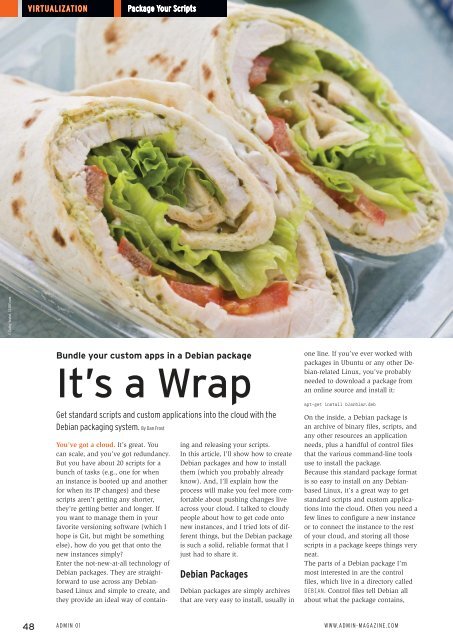ADMIN+Magazine+Sample+PDF
You also want an ePaper? Increase the reach of your titles
YUMPU automatically turns print PDFs into web optimized ePapers that Google loves.
Virtualization<br />
Package Your Scripts<br />
© Cathy Yeulet, 123RF.com<br />
Bundle your custom apps in a Debian package<br />
It’s a Wrap<br />
Get standard scripts and custom applications into the cloud with the<br />
debian packaging system. By Dan Frost<br />
You’ve got a cloud. It’s great. You<br />
can scale, and you’ve got redundancy.<br />
But you have about 20 scripts for a<br />
bunch of tasks (e.g., one for when<br />
an instance is booted up and another<br />
for when its IP changes) and these<br />
scripts aren’t getting any shorter,<br />
they’re getting better and longer. If<br />
you want to manage them in your<br />
favorite versioning software (which I<br />
hope is Git, but might be something<br />
else), how do you get that onto the<br />
new instances simply?<br />
Enter the not-new-at-all technology of<br />
Debian packages. They are straightforward<br />
to use across any Debianbased<br />
Linux and simple to create, and<br />
they provide an ideal way of contain-<br />
ing and releasing your scripts.<br />
In this article, I’ll show how to create<br />
Debian packages and how to install<br />
them (which you probably already<br />
know). And, I’ll explain how the<br />
process will make you feel more comfortable<br />
about pushing changes live<br />
across your cloud. I talked to cloudy<br />
people about how to get code onto<br />
new instances, and I tried lots of different<br />
things, but the Debian package<br />
is such a solid, reliable format that I<br />
just had to share it.<br />
Debian Packages<br />
Debian packages are simply archives<br />
that are very easy to install, usually in<br />
one line. If you’ve ever worked with<br />
packages in Ubuntu or any other Debian-related<br />
Linux, you’ve probably<br />
needed to download a package from<br />
an online source and install it:<br />
apt‐get install blarblar.deb<br />
On the inside, a Debian package is<br />
an archive of binary files, scripts, and<br />
any other resources an application<br />
needs, plus a handful of control files<br />
that the various command-line tools<br />
use to install the package.<br />
Because this standard package format<br />
is so easy to install on any Debianbased<br />
Linux, it’s a great way to get<br />
standard scripts and custom applications<br />
into the cloud. Often you need a<br />
few lines to configure a new instance<br />
or to connect the instance to the rest<br />
of your cloud, and storing all those<br />
scripts in a package keeps things very<br />
neat.<br />
The parts of a Debian package I’m<br />
most interested in are the control<br />
files, which live in a directory called<br />
DEBIAN. Control files tell Debian all<br />
about what the package contains,<br />
48 Admin 01 www.admin-magazine.com


